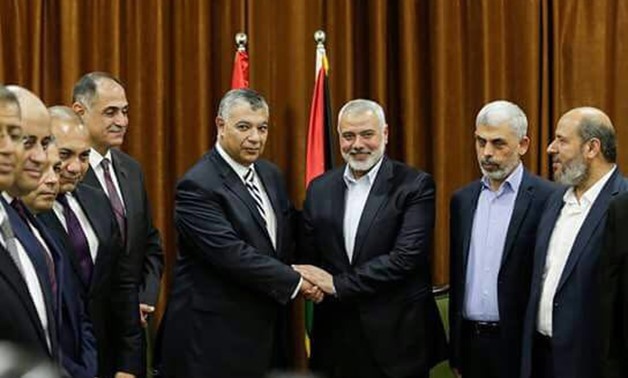
Hamas Leader Ismail Haniyeh receives Egypt's Intelligence Chief Khaled Fawzy in Gaza on October 3, 2017- Press Photo
CAIRO – 25 February 2018: A high-profile Egyptian delegation arrived in the Palestinian Gaza Strip on Sunday to pursue the execution of the reconciliation agreement, which was signed in Cairo in October 2017, between rival Palestinian factions Hamas and Fatah.
The Egyptian delegation is headed by Major General Sameh Nabil from the Egyptian Intelligence, Egypt's general consul to Ramallah Khaled Samy as well as other officials.
After many failed attempts, a significant breakthrough was achieved in the reconciliation talks between the two Palestinian factions. For the first time since 2014, internationally recognized Palestinian Prime Minister Rami Hamdallah held a governmental meeting last October in Gaza — a move that recovered hope in ending the deepest rift Palestine ever experienced.
The meeting came as a result of Egyptian mediation efforts to end the split between the two major Palestinian factions. The Gaza meeting is expected to discuss a number of controversial issues, the most difficult of which would be the security authority in the Gaza Strip and its borders.
Following the signing of the Palestinian reconciliation agreement, Palestinian President Mahmoud Abbas called on Hamas to surrender its weapons to the Palestinian Authority.
“I will not accept reproducing the Hezbollah experience … We are one state, one system, one law and one weapon,” said Abbas.
Hamas proved its good intentions when it accepted the dissolution of its administrative committee and expressed willingness to hold parliamentary elections. Nonetheless, Abbas’ remarks clashed with a sharp rejection from Hamas’ leadership, which stressed that disarming its military wing is not up for discussion as long as Israel occupies Palestinian territories.
Hamas’ strong military wing, the al-Qassam Brigades, is estimated to have 20,000-25,000 fighters in its ranks. These forces enabled the Islamic movement to take control of Gaza after it ousted Fatah representatives from the territory in 2007. Therefore, the Palestinian Authority made itself clear from the very beginning that it would not accept a scenario in the Gaza Strip in which Hamas’ armed wing would be able to hold onto its weapons.
All previous reconciliation attempts between the two sides have failed due to the intensive conflict over the control of borders and security in the Gaza Strip. The question now is, will Hamas accept to hand over its weapons to the Palestinian Authority, or will Cairo-sponsored talks face the same fate?

Hamas's leader Ismail Haniyeh (L) and Palestinian President Mahmoud Abbas – Press Photo
Other difficult issues would be the status of thousands of public service employees hired by Hamas without the Palestinian Authority’s approval, as well as economic sanctions imposed by Abbas in recent months on Gaza to pressure Hamas to compromise. The Palestinian Authority has slashed budgets allocated to purchase electricity from Israel to Gaza, which affected water and power supply to households — not to mention the negative impact on health services.
Hamas was partly responsible for the electricity problem because it took over collecting individual and commercial electricity bills that Gazans had to pay to the Fatah government; however, Hamas was not using this money to buy the needed fuel to keep the generators going.
The Palestinian Authority also cut employees’ salaries in Gaza and limited travel permits for residents seeking medical services outside the besieged strip. Fatah said it would be prepared to restore the various budgets once Hamas enables the legitimate government to exercise its authority over the strip.
Naturally, many of these problems could easily be resolved once the two parties unite under the umbrella of the Palestine Liberation Organization (PLO): the only Palestinian body recognized by Israel and the international community as the sole and legitimate representative of the Palestinian people.
However, implementation of the agreement has since suffered setbacks, including an exchange of accusations of non-commitment to the deal brokered by Egypt.


Comments
Leave a Comment